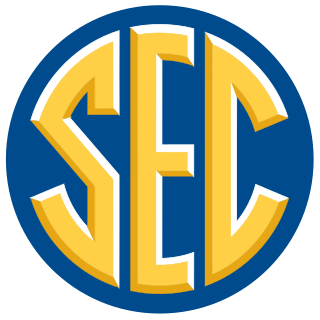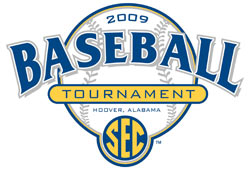
The Southeastern Conference (SEC) is an American college athletic conference whose member institutions are located primarily in the South Central and Southeastern United States. Its fourteen members include the flagship public universities of ten states, three additional public land-grant universities, and one private research university. The conference is headquartered in Birmingham, Alabama. The SEC participates in the National Collegiate Athletic Association (NCAA) Division I in sports competitions; for football it is part of the Football Bowl Subdivision (FBS), formerly known as Division I-A.
The NCAA Division I Baseball Championship is held each year from May through June and features 64 college baseball teams in the United States, culminating in the eight-team College World Series at TD Ameritrade Park Omaha in Omaha, Nebraska. Mississippi State is the 2021 NCAA Division I Baseball Tournament champion, defeating runner-up Vanderbilt 9-0 in Game 3 to win the 2021 College World Series championship finals.

The SEC Men's Basketball Tournament is the conference tournament in basketball for the Southeastern Conference (SEC). It is a single-elimination tournament that involves all league schools. Its seeding is based on regular season records. The winner receives the conference's automatic bid to the NCAA men's basketball tournament, however the official conference championship is awarded to the team or teams with the best regular season record.
The Atlantic Coast Conference Baseball Tournament, sometimes referred to simply as the ACC Tournament, is the conference championship tournament in baseball for the Atlantic Coast Conference (ACC). In 2017, the event adopted a modified twelve-team pool play format. The winner receives the conference's automatic bid to the NCAA Division I Baseball Tournament.
The 1998 Southeastern Conference Baseball Tournament was held at Hoover Metropolitan Stadium in Hoover, Alabama from May 13th through May 17th. Auburn defeated Arkansas in the championship game, earning the Southeastern Conference's automatic bid to the 1998 NCAA Division I Baseball Tournament.
The Conference USA Baseball Tournament is the conference championship tournament in baseball for Conference USA (C-USA). The winner of the tournament receives an automatic bid to the NCAA Division I Baseball Tournament. The tournament format, which has changed several times, currently consists of an eight-team double-elimination tournament format, in which the winners of two four-team brackets play in a single-game final. Rice, which has won the tournament seven times, is the most successful team in the tournament's history.
The Sun Belt Conference Baseball Tournament is the conference championship tournament in baseball for the Sun Belt Conference. The winner of the tournament receives the conference's automatic bid to the NCAA Division I Baseball Tournament. After Coastal Carolina University hosts the competition in Conway, South Carolina in 2019, the tournament will move to a neutral site, Riverwalk Stadium in Montgomery, AL, from 2020 to 2024.

The 2009 Southeastern Conference Baseball Tournament was held at Regions Park in Hoover, AL from May 20th through May 24th. LSU won the tournament and earned the Southeastern Conference's automatic bid to the 2009 NCAA Division I Baseball Tournament. LSU won the College World Series in Omaha, Nebraska.
The 2009 NCAA Division I Baseball Tournament was held from May 29 through June 24, 2009 and is part of the 2009 NCAA Division I baseball season. The 64 NCAA Division I college baseball teams were selected out of an eligible 286 teams on May 25, 2009. Thirty teams were awarded an automatic bid as champions of their conference, and 34 teams were selected at-large by the NCAA Division I Baseball Committee.
The 2010 Southeastern Conference Baseball Tournament was held at Regions Park in Hoover, AL from May 26th through May 30th. LSU won the tournament for the third straight season and earned the Southeastern Conference's automatic bid to the NCAA Tournament.
The 1997 Southeastern Conference Baseball Tournament was the 1997 postseason baseball championship of the NCAA Division I Southeastern Conference, held at Golden Park in Columbus, Georgia from May 14-18. Alabama defeated LSU in the championship game, earning the conference's automatic bid to the 1997 NCAA Division I Baseball Tournament.

The 2013 Southeastern Conference Baseball Tournament was held from May 21 through May 26 at Hoover Metropolitan Stadium in Hoover, Alabama. The annual tournament determined the tournament champion of the Division I Southeastern Conference in college baseball. The tournament champion, LSU, earned the conference's automatic bid to the 2013 NCAA Division I Baseball Tournament.
The 2013 NCAA Division I Baseball Tournament began on Friday, May 31, 2013 as part of the 2013 NCAA Division I baseball season. The 64 team double elimination tournament concluded with the 2013 College World Series in Omaha, Nebraska, which began on June 15 and ended with the final round on June 25. The UCLA Bruins swept the Mississippi State Bulldogs in a best-of-three series to win the NCAA National Championship, the university's first in baseball and the 109th national title in all sports.

The 2015 Southeastern Conference Baseball Tournament was held from May 19 through May 24 at Hoover Metropolitan Stadium in Hoover, Alabama. The annual tournament determined the tournament champion of the Division I Southeastern Conference in college baseball. Florida, the tournament champion, earned the conference's automatic bid to the 2015 NCAA Division I Baseball Tournament.

The 2016 Southeastern Conference Baseball Tournament was held from May 24 through May 29 at Hoover Metropolitan Stadium in Hoover, Alabama. The annual tournament determined the tournament champion of the Division I Southeastern Conference in college baseball. The tournament champion earns the conference's automatic bid to the 2016 NCAA Division I Baseball Tournament

The 2016 NCAA Division I Baseball Tournament began on Friday, June 3, 2016, as part of the 2016 NCAA Division I baseball season. The 64-team, double-elimination tournament concluded with the 2016 College World Series (CWS) in Omaha, Nebraska, starting on June 18, 2016, and ending on June 30, 2016. The 64 participating NCAA Division I college baseball teams were selected out of 298 eligible teams. Thirty-one teams were awarded an automatic bid, as champions of their conferences; the remaining 33 teams were selected at-large by the NCAA Division I Baseball Committee.

The 2017 Southeastern Conference Baseball Tournament was held from May 23 through May 28 at Hoover Metropolitan Stadium in Hoover, Alabama. The annual tournament determined the tournament champion of the Division I Southeastern Conference in college baseball. The tournament champion earned the conference's automatic bid to the 2017 NCAA Division I Baseball Tournament After a search for potential new sites, the SEC named Hoover the host for the 2017 and future events, with a specific term to be negotiated.
The 2021 Southeastern Conference Baseball Tournament was held from May 25 through May 30 at Hoover Metropolitan Stadium in Hoover, Alabama. The annual tournament determined the tournament champion of the Division I Southeastern Conference in college baseball. The Arkansas Razorbacks emerged for the first time as tournament champions, earning the conference's automatic bid to the 2021 NCAA Division I Baseball Tournament.
The 2022 Southeastern Conference Baseball Tournament was held from May 24 through May 29 at Hoover Metropolitan Stadium in Hoover, Alabama. The annual tournament determined the tournament champion of the Division I Southeastern Conference in college baseball. The Tennessee Volunteers earned the conference's automatic bid to the 2022 NCAA Division I Baseball Tournament.






